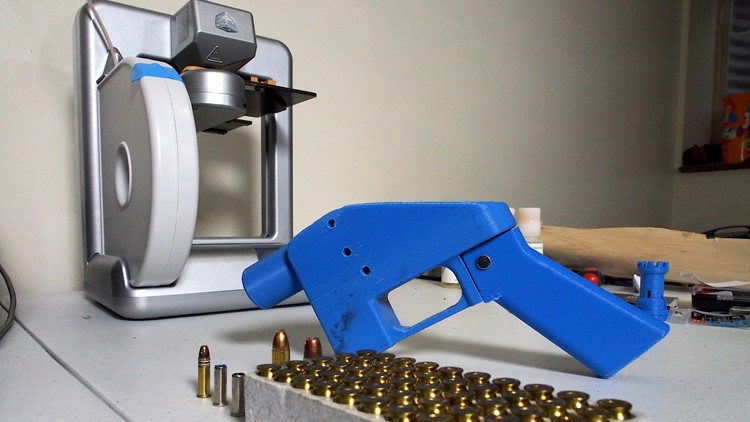A federal judge in Seattle issued a temporary restraining order Tuesday to stop the release of blueprints to make untraceable and undetectable 3D-printed plastic guns, saying they could end up in the wrong hands.
The company behind the plans, Austin, Texas-based Defense Distributed, had reached a settlement with the federal government in June that allows it to make the plans for the guns available for download on Wednesday.
The restraining order from U.S. District Judge Robert Lasnik puts that plan on hold for now.
"There is a possibility of irreparable harm because of the way these guns can be made," he said.
Eight Democratic attorneys general had filed a lawsuit Monday seeking to block the federal government's settlement with Defense Distributed. They also sought the restraining order, arguing the 3D guns would be a safety risk.
Following the order, Attorney General Ferguson issued the following statement:
“Once again, my office had to hold this Administration accountable to the rule of law. I am thankful and relieved Judge Lasnik put a nationwide stop to the Trump Administration’s dangerous decision to allow downloadable, 3D-printed ghost guns to be distributed online. These ghost guns are untraceable, virtually undetectable and, without today’s victory, available to any felon, domestic abuser or terrorist. I hope the President does the right thing and directs his administration to change course.”
Congressional Democrats have urged President Donald Trump to reverse the decision to let Defense Distributed publish the plans. Trump said Tuesday that he's "looking into" the idea, saying making 3D plastic guns available to the public "doesn't seem to make much sense!"
Trump tweeted that he has already spoken with the National Rifle Association about the downloadable directions a Texas company wants to provide for people to make 3D-printed guns. The guns are made of a hard plastic and are simple to assemble, easy to conceal and difficult to trace.
At a news conference Tuesday, Democratic senators said Trump has the power to stop the company from making the plans available online. The company's website says downloads have been posted on the site since Friday. A lawyer for the company said he doesn't know how many blueprints have been downloaded since then.
Massachusetts Sen. Edward Markey said Trump frequently boasts that he alone can fix problems afflicting the country.
"Well, fix this deadly mistake that once again your administration has made," Markey said in a remark directed at the president. If he fails to act, "Donald Trump will be totally responsible for every downloadable, plastic AR-15 (gun) that will be roaming the streets of our country."
Connecticut Sen. Richard Blumenthal was more graphic, saying that if Trump does not block sale of the 3D guns, "Blood is going to be on his hands."
The NRA did not immediately respond to requests for comment.
Markey, Blumenthal and other Democrats filed legislation that would prohibit the publication of a digital file online that allows a 3D printer to manufacture a firearm. Democrats have filed a separate bill to require that all guns have at least one significant component made of metal.
People can use the blueprints to manufacture plastic guns using a 3D printer. But industry experts have expressed doubts that criminals would go to the trouble, since the printers needed to make the guns are very expensive, the guns themselves tend to disintegrate quickly and traditional firearms are easy to come by.
Unlike traditional firearms that can fire thousands of rounds in a lifetime, the 3D-printed guns normally last only a few rounds before they fall apart, experts say.
Cody Wilson, the founder of Defense Distributed, first published downloadable designs for a 3D-printed firearm in 2013. The plans were downloaded about 100,000 times until the State Department ordered him to cease, contending the effort violated federal export laws since some of the blueprints were downloaded by people outside the United States.
The State Department reversed course in late June, agreeing to allow Wilson to resume posting the blueprints.
The company filed its own suit in Texas on Sunday, asserting that it's the victim of an "ideologically fueled program of intimidation and harassment" that violates the company's First Amendment rights.



